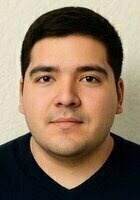All SAT II Spanish Resources
Example Questions
Example Question #1 : Sat Subject Test In Spanish
Fill in the blank with the correct answer.
Ese chico es bajo, __________ chicos son altos.
este
eso
estes
estos
eses
estos
The correct answer is "estos." The word "estes" does not exist as a demonstrative adjective. "Ese" and "este" are the wrong number and "eses" does not exist.
Example Question #1 : Numbers In Spanish
In which of these cities would you be least likely to hear Spanish?
Buenos Aires
Lima
Caracas
São Paolo
Madrid
São Paolo
The student should know that São Paolo is the capital of Brazil, the only country in South america where Spanish is not the official or spoken language. Portuguese, a similar romance language, is used instead.
Example Question #2 : Numbers In Spanish
Please choose the correct answer.
Which culture conquered Spain in the middle ages?
The Assyrians
The Islamic Empire
The Mongols
The Maccabees
The Vikings
The Islamic Empire
The Islamic empire occupied Spain from the 700s until the 1400s. This occupation is evident in the culture of Spain, from the language to the food to the architecture.
Example Question #4 : Sat Subject Test In Spanish
Please fill in the blank with the correct answer
Yo no sé __________ nadar.
a
que
None of these prepositions
en
como
None of these prepositions
The correct answer is "none." The verb "saber" in Spanish already means "to know how" so there is no preposition needed after the verb.
Example Question #5 : Sat Subject Test In Spanish
Fill in the blank with the correct answer.
Me __________ ir al concerto contigo, pero no tengo dinero.
gusto
gustaba
gustó
gustan
gustaría
gustaría
The correct answer is "gustaría," the conditional tense. When translated the sentence means "I would like to go to the concert but I don't have money."
"Gusto" is the wrong tense and person. "Gustaba" and "gustó" are the wrong tense, and "gustan" is the wrong tense and number.
Example Question #6 : Sat Subject Test In Spanish
Fill in the blank with the correct answer
El es hábil pero yo soy __________.
cuerdo
triste
torpe
joven
sano
torpe
The sentence in English is translated to "He is skillful, but I am __________" Knowing this, we must choose the correct word that is the opposite of skillful. "Torpe," "Clumsy" is the correct opposite. The other words are "Sano = Healthy," "Triste = Sad," "Joven = Young," and "Cuerdo = Sane."
Example Question #7 : Sat Subject Test In Spanish
Please fill in the blank with the correct answer.
Lo digo que en Oslo __________ frío en el invierno.
haga
hace
está
es
sea
hace
The correct answer is "hace." First the correct verb must be chosen. With expressions of weather in Spanish, the verb "hacer" is used. Then we are left with "hace" and "haga." Even though there is a "que" introducing a new clause in the sentence, the indicative is used, because there is no emotion or doubt expressed in the first clause; therefore, "hace" must be used.
Example Question #1 : Sat Subject Test In Spanish
What is grammatically incorrect about this sentence?
No creo que ellas pueden resolver los problemas.
The tense of the first verb is incorrect
The definite article in the sentence is incorrect.
The second verb is in the incorrect form.
There is an "a" missing.
The third verb shouldn't be an infinitive.
The second verb is in the incorrect form.
The correct answer is that the second verb in the sentence "pueden" is incorrect. Since the sentence is expressing a doubt, the subjunctive mood must be used. Instead of "pueden," "puedan" is used.
Example Question #9 : Sat Subject Test In Spanish
Which one of these options CANNOT fill in the blank in the following sentence.
Busco __________.
un apartamento
la playa
la oficina
un carro barato
la secretaria
la secretaria
The only thing that cannot correctly fill in this blank is "la secretaria." Since this noun is a person, without the personal "a" before the noun the sentence would be grammatically incorrect.
Example Question #1 : Past Tenses
Fill in the blank with the correct answer.
Nosotros __________ allí por ocho años.
éramos
vivíamos
vivimos
estábamos
íbamos
vivimos
The correct answer is vivimos. Even though the example given "por ocho años" was an action that occurred over a long period of time, since a definitive beginning and ending period is given in the sentence, the only viable verb is "vivimos," as all of the other verbs are in the imperfect tense.
Certified Tutor
All SAT II Spanish Resources




